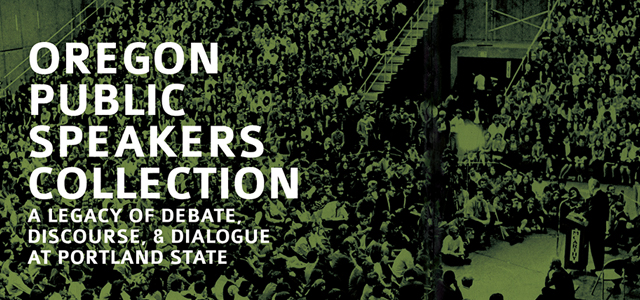Date
11-18-1964
Length
1 hour 4 minutes
Notes
Eleonore Lipschitz, author and member of West Berlin Parliament, was an outspoken critic of the Berlin Wall. In this presentation, she gives a summary of the diplomatic and military events leading to the Western and Soviet control of Germany and Berlin after World War II, and discusses some of the humanitarian, social, and cultural problems created by the Communist division of Berlin.
Transferred and preserved by Portland State University Library’s Special Collections with the generous support of the Institute of Museum and Library Services through the Library Services and Technology Act, administered by the Oregon State Library.
Subjects
Berlin Wall -- Berlin -- Germany -- 1961-1989 -- history, Cold war
Original Format
Reel to reel, 3.75 ips, 1/2 track, mono
Rights
This digital access copy is made available as streaming media for personal, educational, and non-commercial use only. It cannot be reproduced in any form, distributed or played for commercial purposes. It is made accessible because of one or more of the following situations: the rights are owned by State Board of Higher Education, on behalf of Portland State University; Portland State University has permission to make it accessible; it is made accessible for education and research purposes under fair use; or there are no known restrictions on use. In the event that previously unknown information is shared that may change the status of this item, it will be immediately removed from public view until pertinent rights issues are clarified.
Persistent Identifier
http://archives.pdx.edu/ds/psu/11168
Recommended Citation
Lipschitz, Eleonore, ""Berlin: A Tale of Two Cities"" (1964). Special Collections: Oregon Public Speakers. 39.
http://archives.pdx.edu/ds/psu/11168
Included in
Diplomatic History Commons, European History Commons, International Relations Commons, Soviet and Post-Soviet Studies Commons



Description
Transcript added January 6, 2021.
PSU Library Special Collections and University Archives presents these recordings as part of the historical record. They reflect the recollections and opinions of the individual speakers and are not intended to be representative of the views of Portland State University. They may contain language, ideas, or stereotypes that are offensive to others.